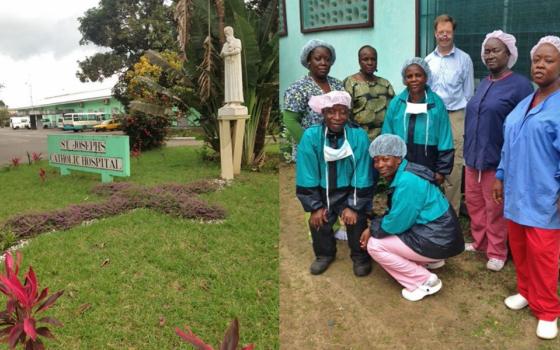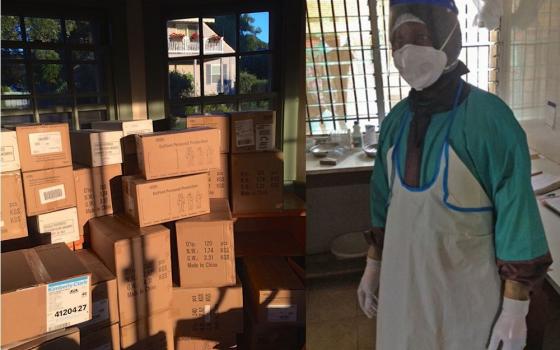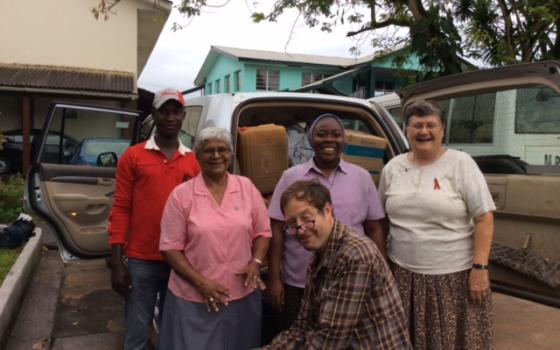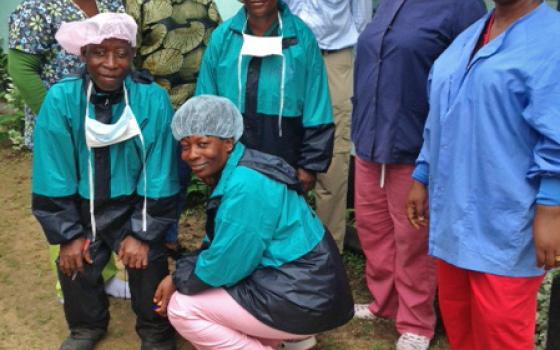There are many front lines in a war, and none are more important than another. That’s how Mary Rizzo, the development coordinator for the Bernardine Franciscan Sisters in Reading, Penn., found herself battling the Ebola crisis in Liberia, even though she was nearly 5,000 miles away.
The Bernardines only have one sister in Liberia, but she’s vital: It’s Sr. Mary Laurene Browne, president of the Catholic-run Stella Maris Polytechnic university in Monrovia.
In August, Rizzo said, Brown asked if the congregation could send gloves and masks and maybe $5,000 to purchase linens and other supplies to help deal with the emerging outbreak.
The plan was to work with other men and women religious in Liberia to educate people on ways to prevent the spread of Ebola, train health care workers and eventually re-open the hospital that had closed.
Rizzo put together 10 suitcases full of gloves and masks and started gathering donations to wire to Browne. But just as the crisis exploded, so did her efforts.
“In three weeks in jumped from 300 people to 3,000 people. Three weeks,” Rizzo said. “By the time you write a check and get it wired to Liberia, the crisis has expanded 10 times.”
And in August, it seemed to Rizzo she was alone against the tide, at least in the United States.
“It became a massive campaign across the country and around the world, because it seemed like at that point no one was doing anything. It was barely mentioned once a week on the news,” Rizzo recalls. “I found I had to do a lot of research myself just to find out what was going on and what was needed, because you’d hear, ‘We can’t get bleach down here,’ or ‘We can’t get gloves down here, they’re selling them on the street for $1 each.’ And it seemed like nobody knew how big this was.”
And since the Bernardines established an aid pipeline early, others trying to help found it easier to join forces than to establish their own, from Marist brothers to health systems to the Conrad N. Hilton Foundation (which also funds Global Sisters Report).
“We’re now up to $165,000 in cash donations, and over $2 million in medical supplies and food,” Rizzo said. Their fourth shipping container full of supplies and food was due to leave the United States Monday.
Rizzo said much of the first response to the outbreak in Liberia came from the religious community, mainly because they were all that was left after others pulled out. It wasn’t a question of whether to help, she said, it was only a question of how.
“There’s people laying on a concrete floor and no one will touch them because they don’t have personal protection kits. ‘So we’ll just lay you in a closed school until you die, then we’ll burn you in the street.’ No wonder people are fearful and rioting,” Rizzo said. “They don’t understand and can’t read, and there’s people in these crazy suits coming into their house and taking away their loved ones. Somebody has to do something.”
What can you do?
The Bernardine’s web site has on its main page the address to mail donations a link to make online donations and a phone number to call for more information about the collective fundraising effort.
Global Sisters Report will continue to cover the Ebola outbreak and how Christians respond. If you’re in Liberia or anywhere else fighting Ebola, GSR wants to hear from you and share your story. Is your religious community stepping up? Your parish? Your religious non-profit? Tell us about it.
Links, tips and accounts of the response to any crisis are always welcome at dstockman@ncronline.org.
[Dan Stockman is national correspondent for Global Sisters Report.]
Related - Sisters in Liberia fight Ebola by Melanie Lidman




